容易翻错的英文短语
犯错误的英文短语
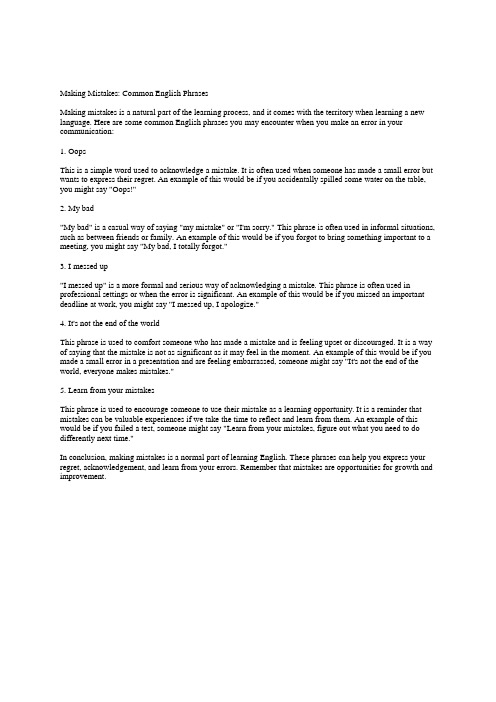
Making Mistakes: Common English PhrasesMaking mistakes is a natural part of the learning process, and it comes with the territory when learning a new language. Here are some common English phrases you may encounter when you make an error in your communication:1. OopsThis is a simple word used to acknowledge a mistake. It is often used when someone has made a small error but wants to express their regret. An example of this would be if you accidentally spilled some water on the table, you might say "Oops!"2. My bad"My bad" is a casual way of saying "my mistake" or "I'm sorry." This phrase is often used in informal situations, such as between friends or family. An example of this would be if you forgot to bring something important to a meeting, you might say "My bad, I totally forgot."3. I messed up"I messed up" is a more formal and serious way of acknowledging a mistake. This phrase is often used in professional settings or when the error is significant. An example of this would be if you missed an important deadline at work, you might say "I messed up, I apologize."4. It's not the end of the worldThis phrase is used to comfort someone who has made a mistake and is feeling upset or discouraged. It is a way of saying that the mistake is not as significant as it may feel in the moment. An example of this would be if you made a small error in a presentation and are feeling embarrassed, someone might say "It's not the end of the world, everyone makes mistakes."5. Learn from your mistakesThis phrase is used to encourage someone to use their mistake as a learning opportunity. It is a reminder that mistakes can be valuable experiences if we take the time to reflect and learn from them. An example of this would be if you failed a test, someone might say "Learn from your mistakes, figure out what you need to do differently next time."In conclusion, making mistakes is a normal part of learning English. These phrases can help you express your regret, acknowledgement, and learn from your errors. Remember that mistakes are opportunities for growth and improvement.。
容易理解错的英文短语
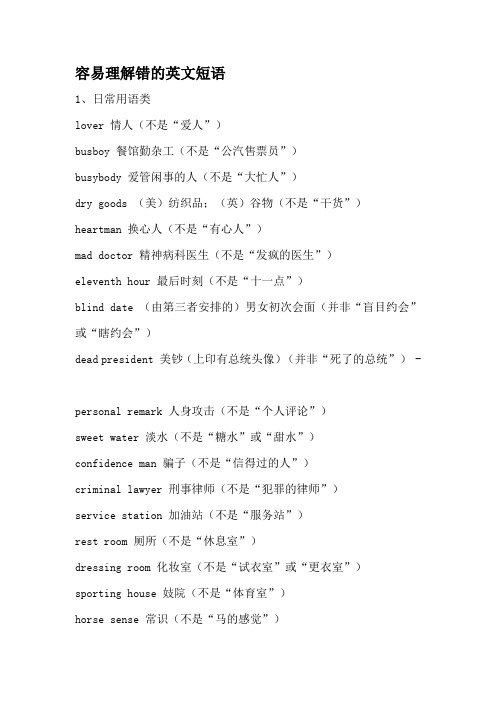
容易理解错的英文短语1、日常用语类lover 情人(不是“爱人”)busboy 餐馆勤杂工(不是“公汽售票员”)busybody 爱管闲事的人(不是“大忙人”)dry goods (美)纺织品;(英)谷物(不是“干货”)heartman 换心人(不是“有心人”)mad doctor 精神病科医生(不是“发疯的医生”)eleventh hour 最后时刻(不是“十一点”)blind date (由第三者安排的)男女初次会面(并非“盲目约会”或“瞎约会”)dead president 美钞(上印有总统头像)(并非“死了的总统”) -personal remark 人身攻击(不是“个人评论”)sweet water 淡水(不是“糖水”或“甜水”)confidence man 骗子(不是“信得过的人”)criminal lawyer 刑事律师(不是“犯罪的律师”)service station 加油站(不是“服务站”)rest room 厕所(不是“休息室”)dressing room 化妆室(不是“试衣室”或“更衣室”)sporting house 妓院(不是“体育室”)horse sense 常识(不是“马的感觉”)capital idea 好主意(不是“资本主义思想”)familiar talk 庸俗的交谈(不是“熟悉的谈话”)black tea 红茶(不是“黑茶”)black art 妖术(不是“黑色艺术”)black stranger 完全陌生的人(不是“陌生的黑人”)white coal (作动力来源用的)水(不是“白煤”)white man 忠实可靠的人(不是“皮肤白的人”)yellow book 黄皮书(法国政府报告书,以黄纸为封)(不是“黄色书籍”)red tape 官僚习气(不是“红色带子”)green hand 新手(不是“绿手”)blue stocking 女学者、女才子(不是“蓝色长统袜”)China policy 对华政策(不是“中国政策”)Chinese dragon 麒麟(不是“中国龙”)American beauty 红蔷薇(不是“美国美女”)English disease 软骨病(不是“英国病”)Indian summer 愉快宁静的晚年(不是“印度的夏日”)Greek gift 害人的礼品(不是“希腊礼物”)Spanish athlete 吹牛的人(不是“西班牙运动员”)French chalk 滑石粉(不是“法国粉笔”)2.成语类pull one's leg 开玩笑(不是“拉后腿”)in one's birthday suit 赤身裸体(不是“穿着生日礼服”)eat one's words 收回前言(不是“食言”)an apple of love 西红柿(不是“爱情之果”)handwriting on the wall 不祥之兆(不是“大字报”)bring down the house 博得全场喝彩(不是“推倒房子”)have a fit 勃然大怒(不是“试穿”)make one's hair stand on end 令人毛骨悚然—恐惧(不是“令人发指——气愤”)be taken in 受骗,上当(不是“被接纳”)think a great deal of oneself 高看或看重自己(不是“为自己想得很多”)pull up one's socks 鼓起勇气(不是“提上袜子”)have the heart to do (用于否定句)忍心做……不是“有心做”或“有意做”)3.表达方式类Look out! 当心!(不是“向外看”)What a shame! 多可惜!真遗憾!(不是“多可耻”)You don't say! 是吗!(不是“你别说”)You can say that again! 说得好!(不是“你可以再说一遍”)I haven't slept better. 我睡得好极了。
易误解的英文词组
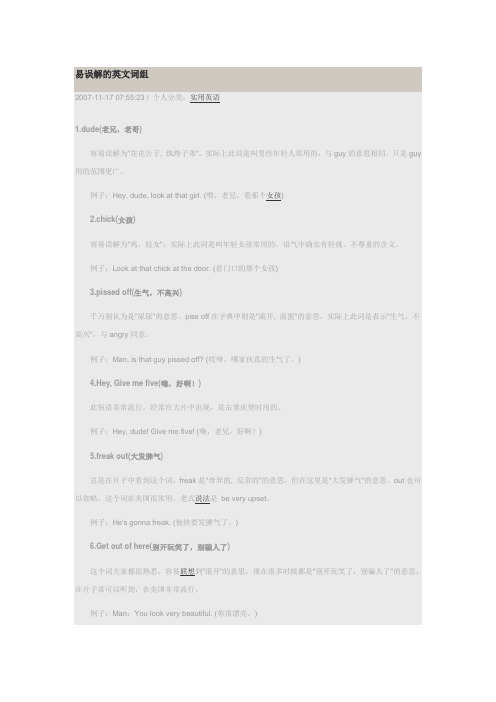
易误解的英文词组2007-11-17 07:55:23 / 个人分类:实用英语1.dude(老兄,老哥)容易误解为"花花公子, 纨绔子弟",实际上此词是叫男性年轻人常用的,与guy的意思相同,只是guy 用的范围更广。
例子:Hey, dude, look at that girl. (喂,老兄,看那个女孩)2.chick(女孩)容易误解为"鸡,妓女",实际上此词是叫年轻女孩常用的,语气中确实有轻佻、不尊重的含义。
例子:Look at that chick at the door. (看门口的那个女孩)3.pissed off(生气,不高兴)千万别认为是"尿尿"的意思。
piss off在字典中则是"滚开, 滚蛋"的意思,实际上此词是表示"生气,不高兴",与angry同意。
例子:Man, is that guy pissed off? (哎呀,哪家伙真的生气了。
)4.Hey, Give me five(嗨,好啊!)此短语非常流行,经常在大片中出现,是击掌庆贺时用的。
例子:Hey, dude! Give me five! (嗨,老兄,好啊!)5.freak out(大发脾气)总是在片子中看到这个词,freak是"奇异的, 反常的"的意思,但在这里是"大发脾气"的意思。
out也可以省略,这个词在美国很常用,老式说法是be very upset。
例子:He's gonna freak. (他快要发脾气了。
)6.Get out of here(别开玩笑了,别骗人了)这个词大家都很熟悉,容易联想到"滚开"的意思,现在很多时候都是"别开玩笑了,别骗人了"的意思,在片子常可以听到,在美国非常流行。
例子:Man:You look very beautiful. (你很漂亮。
中国学生在英文写作中最容易犯的典型错误2

中国学生在英文写作中最容易犯的典型错误G.把状语从句或短语单独成句,破坏了句子的完整性。
(Some students show their natural inclination to write incomplete sentences by punctuating some adverbial clauses or phrases into sentences.)【例1】“Is honesty out of date?” Many people may ask.My answer is “no”.Because honesty is not a single social phenomenon but rather, a kind of humanity rooted in our mind.(×) “Is honesty out of date?” Many people may ask.My answer is “no”,because honesty is not a single social phenomenon but rather, a kind of humanity rooted in our mind.(√)【例2】Traffic is very bad in this city.Particularly in its downtown area.(×)Traffic is very bad in this city, particularly in its downtown area.(√)【例3】And then there is no need worrying you‟11 be lost in a new place,if you have a cellphone.Especially, in some urgent situations.(×)And then there is no need worrying you‟11 be lost in a new place if you have a cellphone,especially in some urgent situations.(√)H.不会使用“there be”结构。
(完整版)英语短语大全

易译错的23个英文短语1.bank holiday不是银行节,是公共假期2.bookmaker不一定是图书业者,有可能是接受赌注的庄家ing of age不是时代来临,而是成年4.crow's feet不是乌鸦脚,而是鱼尾纹5.drawing room不是画室,而是客厅6.living room就是客厅,在英国又称之为 sitting room7.flat-footed不是扁平足,有可能是手足无措。
8.fourth estate不是第四笔地产,是指记者或新闻界9.full of beans不是到处都是豆子,是精力充沛。
不过在美国俚语中另有“错误连篇”的意思10.gray matter不是灰色的东西,是大脑皮层表面的灰质。
大脑里面是白质也就是 whitematter.11.green bean不是绿豆,是四季豆12.hard shoulder不是硬肩膀,是路肩13.headhunt不再是从前食人族的猎头陋习,而是当前流行的“挖角”行为14.heavy duty不是责任重大,是耐用15.hobby horse不是爱马是别人早就听腻,自己却乐此不疲的话题(hobby:—艘译为嗜好,但其实跟中文的嗜好有些不同。
hobby 必须是正面的,花时闲去培养的休闲活动,看电视逛街都不算,骑马 horseback riding 可算是一种 hobby)16.industrial action不是工业行动,是罢工之娄的手段bour of love不是为情所困,是为了兴趣嗜好而无怨无悔做的事k run不是牛奶用光了,是旅行搭的飞机或火车停很多站19.moonshine不一定是月光,也目私酒,或馊主意20.mug shot不是被马克怀击中,是拍照存档21.on the couch不一定是坐在沙发上,是看心理医师22.free shipping不是免费“偷渡”,而是免费邮寄英语短句1. I wasn't born yesterday.(我又不是三岁小孩)2. How do I address you?( 我怎么称呼你)3. She turns me off.( 她使我厌烦。
翻译技巧:汉译英最易翻错的100句(5)
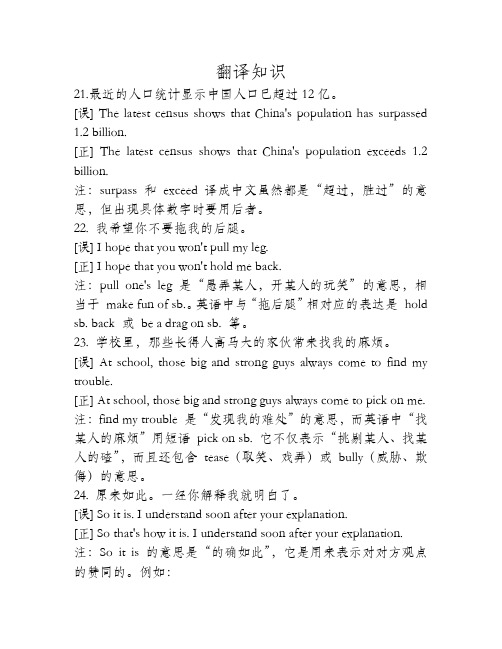
翻译知识21.最近的人口统计显示中国人口已超过12亿。
[误] The latest census shows that China's population has surpassed 1.2 billion.[正] The latest census shows that China's population exceeds 1.2 billion.注:surpass 和exceed 译成中文虽然都是“超过,胜过”的意思,但出现具体数字时要用后者。
22. 我希望你不要拖我的后腿。
[误] I hope that you won't pull my leg.[正] I hope that you won't hold me back.注:pull one's leg 是“愚弄某人,开某人的玩笑”的意思,相当于make fun of sb.。
英语中与“拖后腿”相对应的表达是hold sb. back 或be a drag on sb. 等。
23. 学校里,那些长得人高马大的家伙常来找我的麻烦。
[误] At school, those big and strong guys always come to find my trouble.[正] At school, those big and strong guys always come to pick on me. 注:find my trouble 是“发现我的难处”的意思,而英语中“找某人的麻烦”用短语pick on sb. 它不仅表示“挑剔某人、找某人的碴”,而且还包含tease(取笑、戏弄)或bully(威胁、欺侮)的意思。
24. 原来如此。
一经你解释我就明白了。
[误] So it is. I understand soon after your explanation.[正] So that's how it is. I understand soon after your explanation. 注:So it is 的意思是“的确如此”,它是用来表示对对方观点的赞同的。
必须会的英文短语
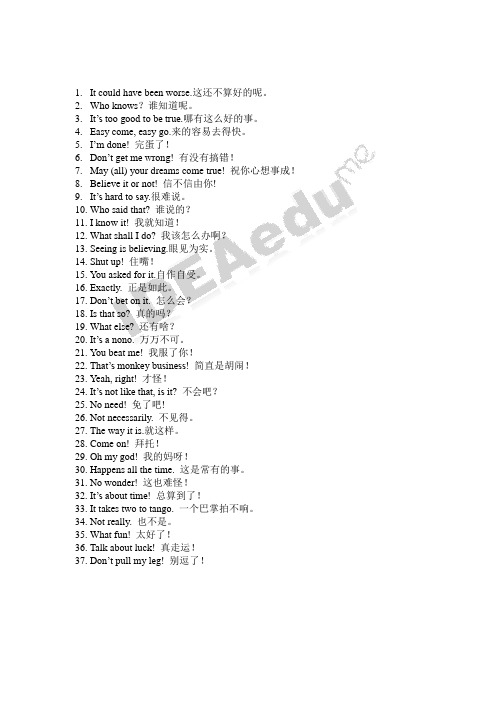
1.It could have been worse.这还不算好的呢。
2.Who knows?谁知道呢。
3.It’s too good to be true.哪有这么好的事。
4.Easy come, easy go.来的容易去得快。
5.I’m done! 完蛋了!6.Don’t get me wrong! 有没有搞错!7.May (all) your dreams come true! 祝你心想事成!8.Believe it or not! 信不信由你!9.It’s hard to say.很难说。
10.Who said that? 谁说的?11.I know it! 我就知道!12.What shall I do? 我该怎么办啊?13.Seeing is believing.眼见为实。
14.Shut up! 住嘴!15.You asked for it.自作自受。
16.Exactly. 正是如此。
17.Don’t bet on it. 怎么会?18.Is that so? 真的吗?19.What else? 还有啥?20.It’s a nono. 万万不可。
21.You beat me! 我服了你!22.That’s monkey business! 简直是胡闹!23.Yeah, right! 才怪!24.It’s not like that, is it? 不会吧?25.No need! 免了吧!26.Not necessarily. 不见得。
27.The way it is.就这样。
e on! 拜托!29.Oh my god! 我的妈呀!30.Happens all the time. 这是常有的事。
31.No wonder! 这也难怪!32.It’s about time! 总算到了!33.It takes two to tango. 一个巴掌拍不响。
34.Not really. 也不是。
笨手笨脚的英文短语

笨手笨脚的英文短语【最新版】目录1.笨手笨脚的英文短语的含义和用法2.常用的笨手笨脚的英文短语3.如何使用笨手笨脚的英文短语正文1.笨手笨脚的英文短语的含义和用法笨手笨脚的英文短语通常用来形容一个人在执行某种任务或活动时手脚不灵活、动作笨拙、缺乏协调性。
这些短语通常带有一定的幽默或讽刺成分,可以用来自嘲或嘲笑别人。
在英语中,描述这种状态的短语有很多,如“clumsy”,“awkward”,“botched”等。
2.常用的笨手笨脚的英文短语以下是一些常用的描述笨手笨脚的英文短语:- All thumbs: 这个短语形象地表示一个人手忙脚乱、笨手笨脚的样子。
- Clumsy: 形容一个人行动不协调,容易出错。
- Awkward: 形容一个人手脚不灵活、行动笨拙。
- Botched: 形容一个人把事情搞砸了,做事不灵活。
- Fumble: 形容一个人在处理某件事情时,由于紧张或不熟练而犯错。
- Bungle: 形容一个人把事情搞得一团糟,做事不得要领。
3.如何使用笨手笨脚的英文短语在日常生活中,我们可以使用这些短语来自嘲或者调侃别人。
例如,当你不小心打翻了水杯,你可以说:“I"m all thumbs today.(今天我一定是手忙脚乱。
)”或者“I guess I was being clumsy.(我想我刚才真是笨手笨脚了。
)”。
你也可以用这些短语来形容别人,例如:“He"s always botching things up.(他总是把事情搞砸。
)”或者“She"s so awkward, she can"t even walk straight.(她真笨拙,连路都走不直。
)”。
总之,了解并学会使用这些描述笨手笨脚的英文短语,不仅可以丰富你的词汇量,还能让你更准确地表达自己的感受和观察。
容易翻译错的英文短语
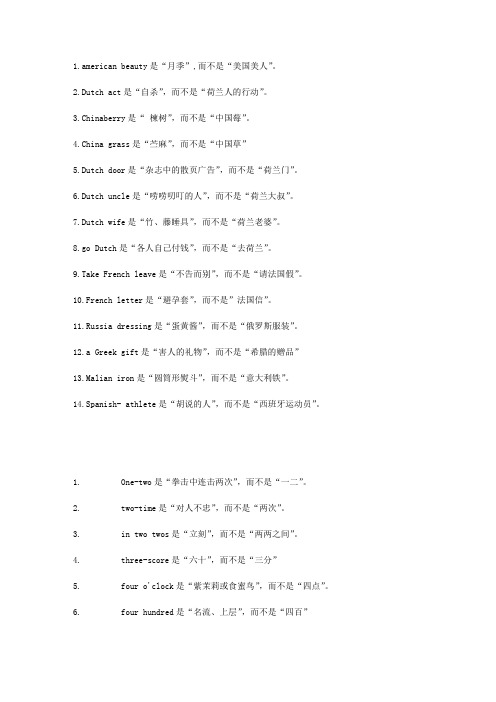
1.american beauty是“月季”,而不是“美国美人”。
2.Dutch act是“自杀”,而不是“荷兰人的行动”。
3.Chinaberry是“楝树”,而不是“中国莓”。
4.China grass是“苎麻”,而不是“中国草”5.Dutch door是“杂志中的散页广告”,而不是“荷兰门”。
6.Dutch uncle是“唠唠叨叮的人”,而不是“荷兰大叔”。
7.Dutch wife是“竹、藤睡具”,而不是“荷兰老婆”。
8.go Dutch是“各人自己付钱”,而不是“去荷兰”。
9.Take French leave是“不告而别”,而不是“请法国假”。
10.French letter是“避孕套”,而不是”法国信”。
11.Russia dressing是“蛋黄酱”,而不是“俄罗斯服装”。
12.a Greek gift是“害人的礼物”,而不是“希腊的赠品”13.Malian iron是“圆筒形熨斗”,而不是“意大利铁”。
14.Spanish- athlete是“胡说的人”,而不是“西班牙运动员”。
1. One-two是“拳击中连击两次”,而不是“一二”。
2. two-time是“对人不忠”,而不是“两次”。
3. in two twos是“立刻”,而不是“两两之间”。
4. three-score是“六十”,而不是“三分”5. four o'clock是“紫茉莉或食蜜鸟”,而不是“四点”。
6. four hundred是“名流、上层”,而不是“四百”7. five-finer是“贼”,类似汉语的“三只手”,而不是“五指”8. at sixes and sevens是“乱七八糟”,而和“六”无关。
9. tight-ball是“老实人”,这里的“八”和“发”无关。
10. to the tens是“打扮得极为华丽”,而不是“数到十”11. a white day是“良晨吉日”,而不是“大白天”。
12. a white elephant是“沉重的负担”,而不是“白象”。
英语四级100个常用的英文短语(2)
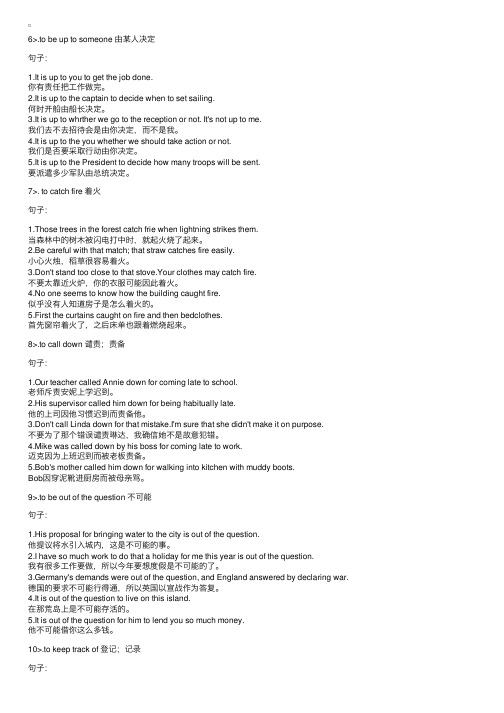
6>.to be up to someone 由某⼈决定句⼦:1.It is up to you to get the job done.你有责任把⼯作做完。
2.It is up to the captain to decide when to set sailing.何时开船由船长决定。
3.It is up to whrther we go to the reception or not. It's not up to me.我们去不去招待会是由你决定,⽽不是我。
4.It is up to the you whether we should take action or not.我们是否要采取⾏动由你决定。
5.It is up to the President to decide how many troops will be sent.要派遣多少军队由总统决定。
7>. to catch fire 着⽕句⼦:1.Those trees in the forest catch frie when lightning strikes them.当森林中的树⽊被闪电打中时,就起⽕烧了起来。
2.Be careful with that match; that straw catches fire easily.⼩⼼⽕烛,稻草很容易着⽕。
3.Don't stand too close to that stove.Your clothes may catch fire.不要太靠近⽕炉,你的⾐服可能因此着⽕。
4.No one seems to know how the building caught fire.似乎没有⼈知道房⼦是怎么着⽕的。
5.First the curtains caught on fire and then bedclothes.⾸先窗帘着⽕了,之后床单也跟着燃烧起来。
(完整版)英语句子翻译技巧.doc
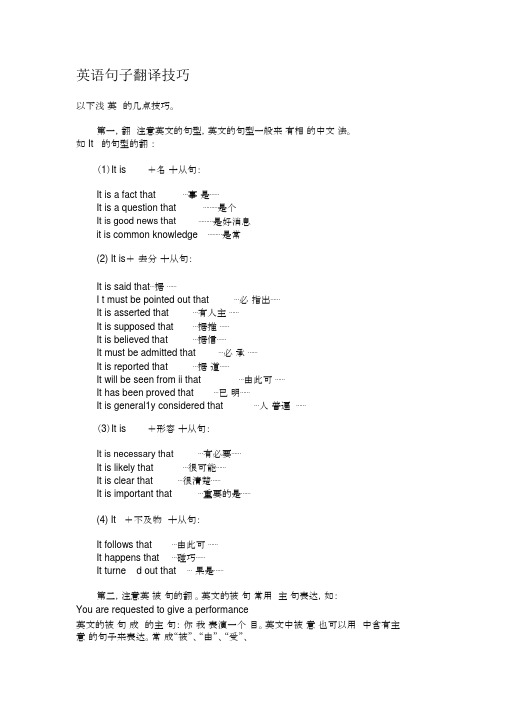
英语句子翻译技巧以下浅英的几点技巧。
第一,翻注意英文的句型,英文的句型一般来有相的中文法。
如 It的句型的翻:(1)It is+名十从句:It is a fact thatIt is a question that It is good news that ⋯事是⋯⋯⋯⋯⋯是个⋯⋯⋯是好消息it is common knowledge⋯⋯⋯是常(2)It is+去分十从句:It is said that⋯据⋯⋯I t must be pointed out that ⋯必指出⋯⋯It is asserted that ⋯有人主⋯⋯It is supposed that ⋯据推⋯⋯It is believed that ⋯据信⋯⋯It must be admitted that ⋯必承⋯⋯It is reported that ⋯据道⋯⋯It will be seen from ii that ⋯由此可⋯⋯It has been proved that ⋯已明⋯⋯It is general1y considered that ⋯人普遍⋯⋯(3)It is+形容十从句:It is necessary that It is likely thatIt is clear thatIt is important that⋯有必要⋯⋯⋯很可能⋯⋯⋯很清楚⋯⋯⋯重要的是⋯⋯(4)It +不及物十从句:It follows that⋯由此可⋯⋯It happens that⋯碰巧⋯⋯It turne d out that⋯果是⋯⋯第二,注意英被句的翻。
英文的被句常用主句表达,如:You are requested to give a performance英文的被句成的主句:你我表演一个目。
英文中被意也可以用中含有主意的句子来表达。
常成“被”、“由”、“受”、“ ⋯所”等等。
例如:What is feared as failure in American society is ,above all , loneliness. (在美国社会中作失而人所恐惧的,莫于孤独了。
interpret 用法
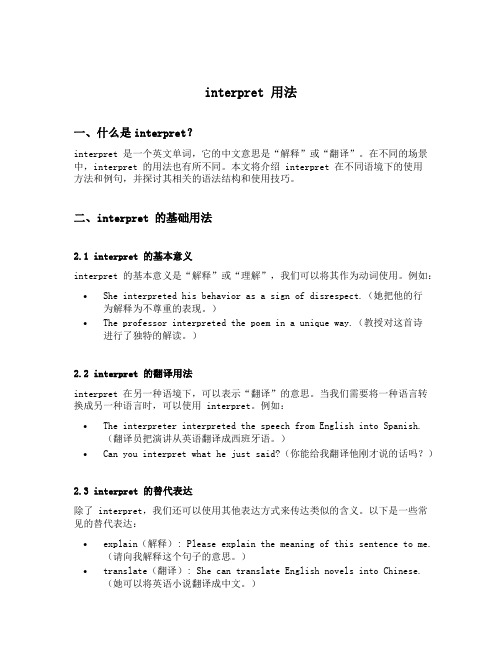
interpret 用法一、什么是interpret?interpret 是一个英文单词,它的中文意思是“解释”或“翻译”。
在不同的场景中,interpret 的用法也有所不同。
本文将介绍 interpret 在不同语境下的使用方法和例句,并探讨其相关的语法结构和使用技巧。
二、interpret 的基础用法2.1 interpret 的基本意义interpret 的基本意义是“解释”或“理解”,我们可以将其作为动词使用。
例如:•She interpreted his behavior as a sign of disrespect.(她把他的行为解释为不尊重的表现。
)•The professor interpreted the poem in a unique way.(教授对这首诗进行了独特的解读。
)2.2 interpret 的翻译用法interpret 在另一种语境下,可以表示“翻译”的意思。
当我们需要将一种语言转换成另一种语言时,可以使用 interpret。
例如:•The interpreter interpreted the speech from English into Spanish.(翻译员把演讲从英语翻译成西班牙语。
)•Can you interpret what he just said?(你能给我翻译他刚才说的话吗?)2.3 interpret 的替代表达除了 interpret,我们还可以使用其他表达方式来传达类似的含义。
以下是一些常见的替代表达:•explain(解释): Please explain the meaning of this sentence to me.(请向我解释这个句子的意思。
)•translate(翻译): She can translate English novels into Chinese.(她可以将英语小说翻译成中文。
)•decipher(解码): He tried to decipher the secret message.(他试图解密那个秘密信息。
实用英语短语-英语学习最常见的中国式错误短语

32 个最常见的中国式错误短语1.欢迎你到...Chinglish:welcome you to ...English:welcome to ...2.永远记住你Chinglish:remember you foreverEnglish:always remember you没有人能活至U forever)3. 祝你有个...Chinglish:wish you have a ...English:I wish you a ...4. 给你Chinglish:give youEnglish:here you are5.很喜欢...Chinglish:very like ...English:like ... very much6.黄头发Chinglish:yellow hairEnglish:blond/blonde(西方人没有yellow hair 的说法)7.厕所Chinglish:WCEnglish:men's room/women's room/restroom8.真遗憾Chinglish:it's a pityEnglish:that's too bad/it's a shame(it's a pity说法太老)9.裤子Chinglish:trousersEnglish:pants/slacks/jeans10.修理Chinglish:mendEnglish:fix/repair11.入口Chinglish:way inEnglish:entrance12.出口Chinglish:way outEnglish: (way out 在口语中是crazy 的意思)13.勤奋Chinglish:diligentEnglish:hardworking/studious/conscientious14.应该Chinglish:ShouldEnglish:must/shall15.火锅Chinglish:chafing dishEnglish:hot pot16.大厦Chinglish:MansionEnglish:center/plaza17.马马虎虎Chinglish:so-soEnglish:average/fair/all right/not too bad/OK(西方人很少使用so-so)18.好吃Chinglish:DeliciousEnglish:good/nice/tasty/appetizing(delicious在中国被滥用)19.尽我最大努力Chinglish:try my bestEnglish:try/strive(try 的本意就是try my best)20.有名Chinglish:famousEnglish:well-known/renowned/legendary/popular(famous在中国被滥用)21.滑稽Chinglish:HumorousEnglish:funny/witty/amusing/entertaining22.欺骗Chinglish:to cheatEnglish:to trick/to play a joke on/to con/to deceive/to rip off23.车门Chinglish:the door of the carEnglish:the car's door24.怎么拼?Chinglish:how to spell?English:how do you spell?25.再见Chinglish:bye-byeEnglish:bye/see you/see you later/later(bye-bye有些孩子气)26.玩Chinglish:PlayEnglish:go to/do(play 在中国被滥用)27.面条Chinglish:NoodlesEnglish:pasta(noodles有些孩子气)28.据说Chinglish:It is saidEnglish:I heard/I read/I was told29.等等Chinglish:and so onEnglish:etc. etcetera30.直到现在Chinglish:till nowEnglish:recently/lately/thus far31.农民Chinglish:peasantEnglish:farmer32.宣传Chinglish:propagandaEnglish:Information1. 这个价格对我挺合适的误:The price is very suitable for me.正:The price is right.12 个最典型的中国式错误句子提示:suitable(合适的、相配的)最常见的用法是以否定的形式出现在告示或通知上,如:下列节目儿童不宜。
英文短语

1. I see.我明白了。
2. I quit! 我不干了!3. Let go! 放手!4. Me too.我也是。
5. My god! 天哪!6. No way! 不行!7. Come on.来吧(赶快)8. Hold on.等一等。
9. I agree。
我同意。
10. Not bad.还不错。
11. Not yet.还没。
12. See you.再见。
13. Shut up! 闭嘴!14. So long.再见。
15. Why not? 好呀! (为什么不呢?)16. Allow me.让我来。
17. Be quiet! 安静点!18. Cheer up! 振作起来!19. Good job! 做得好!20. Have fun! 玩得开心!21. How much? 多少钱?22. I'm full.我饱了。
23. I'm home.我回来了。
24. I'm lost.我迷路了。
25. My treat.我请客。
26. So do I.我也一样。
27. This way。
这边请。
28. After you.您先。
29. Bless you! 祝福你!30. Follow me.跟我来。
31. Forget it! 休想! (算了!)32. Good luck! 祝好运!33. I decline! 我拒绝!34. I promise.我保证。
35. Of course! 当然了!36. Slow down! 慢点!37. Take care! 保重!38. They hurt.(伤口)疼。
39. Try again.再试试。
40. Watch out! 当心。
41. What's up? 有什么事吗?42. Be careful! 注意!43. Bottoms up! 干杯(见底)!44. Don't move! 不许动!45. Guess what? 猜猜看?46. I doubt it 我怀疑。
ababaabb英文短语
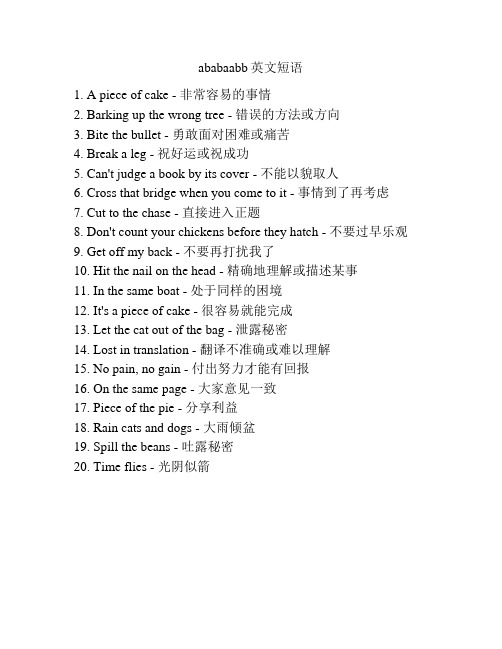
ababaabb英文短语
1. A piece of cake - 非常容易的事情
2. Barking up the wrong tree - 错误的方法或方向
3. Bite the bullet - 勇敢面对困难或痛苦
4. Break a leg - 祝好运或祝成功
5. Can't judge a book by its cover - 不能以貌取人
6. Cross that bridge when you come to it - 事情到了再考虑
7. Cut to the chase - 直接进入正题
8. Don't count your chickens before they hatch - 不要过早乐观
9. Get off my back - 不要再打扰我了
10. Hit the nail on the head - 精确地理解或描述某事
11. In the same boat - 处于同样的困境
12. It's a piece of cake - 很容易就能完成
13. Let the cat out of the bag - 泄露秘密
14. Lost in translation - 翻译不准确或难以理解
15. No pain, no gain - 付出努力才能有回报
16. On the same page - 大家意见一致
17. Piece of the pie - 分享利益
18. Rain cats and dogs - 大雨倾盆
19. Spill the beans - 吐露秘密
20. Time flies - 光阴似箭。
笨手笨脚的英文短语
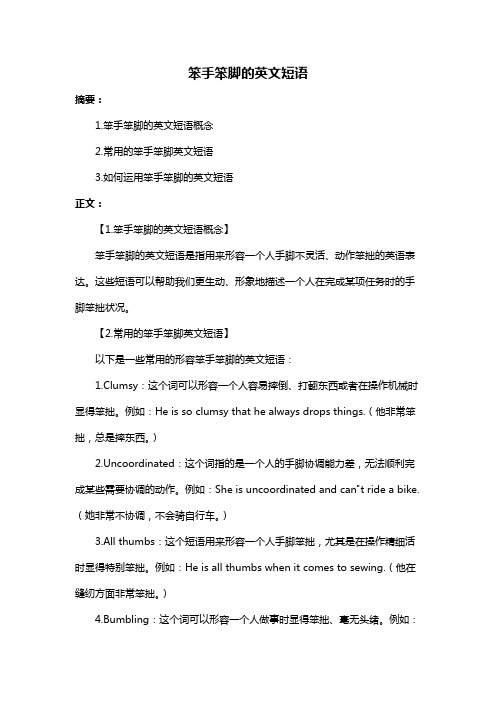
笨手笨脚的英文短语摘要:1.笨手笨脚的英文短语概念2.常用的笨手笨脚英文短语3.如何运用笨手笨脚的英文短语正文:【1.笨手笨脚的英文短语概念】笨手笨脚的英文短语是指用来形容一个人手脚不灵活、动作笨拙的英语表达。
这些短语可以帮助我们更生动、形象地描述一个人在完成某项任务时的手脚笨拙状况。
【2.常用的笨手笨脚英文短语】以下是一些常用的形容笨手笨脚的英文短语:1.Clumsy:这个词可以形容一个人容易摔倒、打翻东西或者在操作机械时显得笨拙。
例如:He is so clumsy that he always drops things.(他非常笨拙,总是摔东西。
)2.Uncoordinated:这个词指的是一个人的手脚协调能力差,无法顺利完成某些需要协调的动作。
例如:She is uncoordinated and can"t ride a bike.(她非常不协调,不会骑自行车。
)3.All thumbs:这个短语用来形容一个人手脚笨拙,尤其是在操作精细活时显得特别笨拙。
例如:He is all thumbs when it comes to sewing.(他在缝纫方面非常笨拙。
)4.Bumbling:这个词可以形容一个人做事时显得笨拙、毫无头绪。
例如:The bumbling waiter spilled soup on the customer"s dress.(这个笨拙的服务员把汤洒在了顾客的裙子上。
)【3.如何运用笨手笨脚的英文短语】在实际英语交流中,我们可以根据不同情境选择合适的笨手笨脚英文短语。
以下是一些例子:1.当我们描述自己在某项活动中表现笨拙时,可以使用这些短语。
例如:I am so clumsy that I dropped the plate and broke it.(我非常笨拙,把盘子摔碎了。
)2.当我们形容别人在某个时刻显得笨拙时,也可以使用这些短语。
例如:The new employee is uncoordinated and keeps making mistakes.(这位新员工非常不协调,总是犯错。
不知所措的英文短语

不知所措的英文短语英语是现代国际交流的重要语言之一,掌握英语对于个人和职业发展都具有重要意义。
然而,对于很多初学者来说,学习英语并不是一件容易的事情,尤其是掌握英文短语。
下面将介绍一些常用的不知所措的英文短语,帮助大家更好地理解和运用。
1. At a loss for words意思:语塞,无言以对例句:When the teacher asked her about the mistake she made, she was at a loss for words.2. Confused as a child in a candy store意思:像小孩进了糖果店一样困惑例句:When I entered the new supermarket, I was confused as a child ina candy store for all the different options.3. In over one’s head意思:不知所措,应接不暇例句:He took on too many projects at once and now he's in over his head.4. All Greek to me意思:像希腊文一样,完全不懂例句:I tried to read that book on astrophysics, but it was all Greek to me.5. Lost in translation意思:翻译时失去原意例句:When she tried to explain the joke in English, it was lost in translation and nobody laughed.6. Like a deer caught in headlights意思:像被车灯照到的鹿,惊慌失措例句:When she was asked to give a presentation in front of a large audience, she froze like a deer caught in headlights.7. Up in the air意思:未确定,悬而未决例句:The plans for our vacation are still up in the air, we haven't decided on a destination yet.8. Between a rock and a hard place意思:进退两难,左右为难例句:He's between a rock and a hard place because he doesn't want to upset his boss, but he also doesn't want to work overtime.9. Barking up the wrong tree意思:找错方向,弄错对象例句:If you think I'm the one who ate your sandwich, you're barking up the wrong tree.10. Out of my depth意思:超出我的能力范围例句:When they started discussing advanced calculus, I realized I was out of my depth and didn't understand anything.11. In hot water意思:陷入麻烦,惹上麻烦例句:He forgot to finish his assignment and now he's in hot water with his teacher.12. Caught between two stools意思:拿不定主意,犹豫不决例句:She's caught between two stools - she wants to take a gap year, but she also wants to start university.以上是一些常用的不知所措的英文短语。
错误地无意地英文短语

错误地无意地英文短语你知道错误地无意地英文短语的具体用法吗?下面是店铺给大家整理的错误地无意地英文短语,供大家参阅!错误地的英文短语1. The magazine suggested incorrectly that he was planning to retire.该杂志错误地暗示他正打算退休。
2. He mistakenly ascribes the expression "survival of the fittest" to Charles Darwin.他错误地认为“适者生存”是查尔斯·达尔文说的。
3. His bank wrongly bounced cheques worth £75,000.他的开户银行错误地拒付了票面金额为75,000英镑的支票。
4. They were deliberately misinformed about their rights.有人故意向他们错误地说明了他们的权利。
5. The senator claims to have been misquoted in the article.参议员声称文章错误地引用了他的话。
6. We mistook assumption that the price would fall.我们错误地认为价格会下降.7. She was wrongly labelled a liar.她被错误地扣上说谎者的帽子.8. Her confidence in him was entirely misplaced.她完全错误地相信了他.9. He claimed that he had been misquoted and he threatened to sue the magazine for libel.他声称自己的话被错误地引用,并威胁说要以诽谤罪起诉这家杂志。
10. Researchers wrongly assumed that people were quite clear about the demands of the task.研究人员错误地认为大家都很清楚该项任务的要求。
- 1、下载文档前请自行甄别文档内容的完整性,平台不提供额外的编辑、内容补充、找答案等附加服务。
- 2、"仅部分预览"的文档,不可在线预览部分如存在完整性等问题,可反馈申请退款(可完整预览的文档不适用该条件!)。
- 3、如文档侵犯您的权益,请联系客服反馈,我们会尽快为您处理(人工客服工作时间:9:00-18:30)。
1.词汇类
lover 情人(不是“爱人”)
busboy 餐馆勤杂工(不是“公汽售票员”)
busybody 爱管闲事的人(不是“大忙人”)
dry goods (美)纺织品;(英)谷物(不是“干货”)
heartman 换心人(不是“有心人”)
mad doctor 精神病科医生(不是“发疯的医生”)
eleventh hour 最后时刻(不是“十一点”)
blind date (由第三者安排的)男女初次会面(并非“盲目约会”或“瞎约会”)dead president 美钞(上印有总统头像)(并非“死了的总统”)
personal remark 人身攻击(不是“个人评论”)
sweet water 淡水(不是“糖水”或“甜水”)
confidence man 骗子(不是“信得过的人”)
criminal lawyer 刑事律师(不是“犯罪的律师”)
service station 加油站(不是“服务站”)
rest room 厕所(不是“休息室”)
dressing room 化妆室(不是“试衣室”或“更衣室”)
sporting house 妓院(不是“体育室”)
horse sense 常识(不是“马的感觉”)
capital idea 好主意(不是“资本主义思想”)
familiar talk 庸俗的交谈(不是“熟悉的谈话”)
black tea 红茶(不是“黑茶”)
black art 妖术(不是“黑色艺术”)
black stranger 完全陌生的人(不是“陌生的黑人”)
white coal (作动力来源用的)水(不是“白煤”)
white man 忠实可靠的人(不是“皮肤白的人”)
yellow book 黄皮书(法国政府报告书,以黄纸为封)(不是“黄色书籍”)
red tape 官僚习气(不是“红色带子”)
green hand 新手(不是“绿手”)
blue stocking 女学者、女才子(不是“蓝色长统袜”)
China policy 对华政策(不是“中国政策”)
Chinese dragon 麒麟(不是“中国龙”)
American beauty 红蔷薇(不是“美国美女”)
English disease 软骨病(不是“英国病”)
Indian summer 愉快宁静的晚年(不是“印度的夏日”)
Greek gift 害人的礼品(不是“希腊礼物”)
Spanish athlete 吹牛的人(不是“西班牙运动员”)
French chalk 滑石粉(不是“法国粉笔”)
2.成语类
pull one's leg 开玩笑(不是“拉后腿”)
in one's birthday suit 赤身裸体(不是“穿着生日礼服”)
eat one's words 收回前言(不是“食言”)
an apple of love 西红柿(不是“爱情之果”)
handwriting on the wall 不祥之兆(不是“大字报”)
bring down the house 博得全场喝彩(不是“推倒房子”)
have a fit 勃然大怒(不是“试穿”)
make one's hair stand on end 令人毛骨悚然—恐惧(不是“令人发指——气愤”)
be taken in 受骗,上当(不是“被接纳”)
think a great deal of oneself 高看或看重自己(不是“为自己想得很多”)
pull up one's socks 鼓起勇气(不是“提上袜子”)
have the heart to do (用于否定句)忍心做……不是“有心做”或“有意做”)
3.表达方式类
Look out! 当心!(不是“向外看”)
What a shame! 多可惜!真遗憾!(不是“多可耻”)
You don't say! 是吗!(不是“你别说”)
You can say that again! 说得好!(不是“你可以再说一遍”)
I haven't slept better. 我睡得好极了。
(不是“我从未睡过好觉”)
You can't be too careful in your work. 你工作越仔细越好。
(不是“你工作不能太仔细”)
It has been 4 years since I smoked. 我戒烟4年了。
(不是“我抽烟4年了”)
All his friends did not turn up. 他的朋友没全到。
(不是“他的朋友全没到”)
People will be long forgetting her. 人们在很长时间内会记住她的。
(不是“人们会永远忘记她”)
He was only too pleased to let them go. 他很乐意让他们走。
(不是“他太高兴了,不愿让他们走”)
It can't be less interesting. 它无聊极了。
(不是“它不可能没有趣”)。
